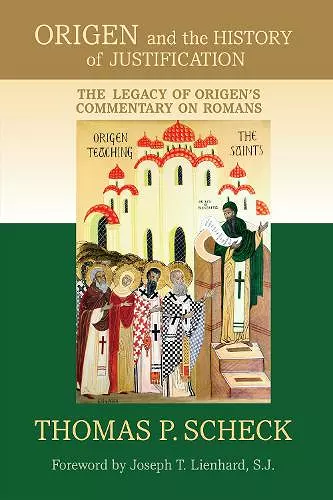Origen and the History of Justification
The Legacy of Origen's Commentary on Romans
Format:Paperback
Publisher:University of Notre Dame Press
Published:15th Feb '16
Currently unavailable, and unfortunately no date known when it will be back
This paperback is available in another edition too:
- Hardback£86.00(9780268041281)

Standard accounts of the history of interpretation of Paul’s Letter to the Romans often begin with St. Augustine. As Thomas P. Scheck demonstrates, however, the Commentary on the Epistle to the Romans by Origen of Alexandria (185-254 CE) was a major work of Pauline exegesis which, by means of the Latin translation preserved in the West, had a significant influence on the Christian exegetical tradition.
Scheck begins by exploring Origen’s views on justification and on the intimate connection of faith and post-baptismal good works as essential to justification. He traces the enormous influence Origen’s Commentary on Romans had on later theologians in the Latin West, including the ways in which theologians often appropriated Origen’s exegesis in their own work. Scheck analyzes in particular the reception of Origen by Pelagius, Augustine, William of St. Thierry, Erasmus, Cornelius Jansen, the Anglican Bishop Richard Montagu, and the Catholic lay apologist John Heigham, as well as Martin Luther, Philip Melanchthon, and other Protestant Reformers who harshly attacked Origen’s interpretation as fatally flawed. But as Scheck shows, theologians through the post-Reformation controversies of the sixteenth and seventeenth centuries studied and engaged Origen extensively, even if not always in agreement.
An important work in patristics, biblical interpretation, and historical theology, Origen and the History of Justification establishes the formative role played by Origen’s Pauline exegesis, while also contributing to our understanding of the theological issues surrounding justification in the western Christian tradition.
“This book . . . is a welcome contribution to the history of Origen’s influence on the interpretation of the New Testament. . . . This book certainly deserves to be studied by historians, Biblical scholars, and systematic theologians . . . a valuable contribution to the study of the history of Biblical exegesis.” —Vigilae Christianae
“This is a marvelous book. The standard wisdom when it comes to the doctrine of justification by faith has been that the writers of the early church fell short of its primary meaning: which was Paul’s true intention. . . . Thomas Scheck challenges this construction by looking carefully at how Rufinus’ Latin version of Origen’s Commentary on the Romans was received and interpreted by Augustine, Erasmus, Luther, and several writers from the post-reformation in the seventeenth century.” —Scottish Bulletin of Evangelical Theology
“[T]his book is to be applauded for its boldness. . . . Second, this book provides a service for scholars by assembling such a significant portion of the essential primary evidence for the crucial issue of justification into one volume. Third, while not discussed in detail in the foregoing, this book is written in a style that is at once clear, concise and accessible.” —Augustiniana
“According to Alister McGrath in . . . Justitia Dei: A History of the Christian Doctrine of Justification, justification was simply not an issue in pre-Augustinian patristic thought. Thomas Scheck decisively refutes and corrects that claim in this new monograph, which not only tracks the legacy of Origen’s commentary on Romans in the West but argues convincingly that already with Origen there was a lively debate about the very issues of law, righteousness, faith, works, freedom, and merit that so exercised Augustine, Pelagius, and their later commentators.” —Augustinian Studies
“Scheck has given us a highly readable and insightful introduction to Origen’s Commentary on Romans, its historical reception, and the major theological positions that have drawn from its pages and for which, remarkably, it continues to be a valuable, and perhaps ultimately indispensable, reference text.” —Erasmus of Rotterdam Society Yearbook
“In the lively and sometimes rancorous debate over justification that has rippled throughout the Christian world, all roads, it seems, lead back to the sixteenth century. . . . Thomas Scheck’s book makes the case that all who think this conversation matters must travel much further back in the Christian story. Indeed, he argues that Origen’s Commentary on Romans has influenced Christian thought on justification into the 16th-century Reformation and beyond. Further, the third-century Alexandrian’s readings of Romans were both close to Paul and remarkably relevant to 21st-century discussions.” —The Conrad Grebel Review
“. . . this book . . . deserves to be described as a work of mature scholarship. It focuses on Origen’s interpretation of what St. Paul said about justification in his Letter to the Romans. . . . Scheck has convincingly shown that Origen’s exegesis of Romans and his interpretation of Paul on justification are well worth the attention of scholars and serious students engaged in those disciplines.” —Religious Studies Review
“The study investigates Origen’s understanding of justification in Paul’s Letter to the Romans, and the subsequent reception of that understanding in Latin Christian tradition. …this book will be of interest mostly to scholars of patristic exegesis and historians of Christian doctrine and biblical interpretation.” —Journal of Early Christian Studies
“Scheck's book renders a valuable service in drawing attention to the recent recovery of Origen's exegetical legacy and highlighting the longevity of certain of his ideas, particularly the notion that justification stands in synecdoche for the life of grace-infused virtue. This is a real contribution, and not to be lightly overlooked.” —Journal of Theological Studies
ISBN: 9780268041533
Dimensions: 229mm x 152mm x 18mm
Weight: 461g
310 pages